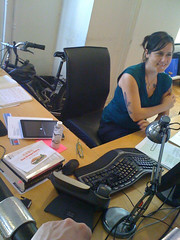 Image via Wikipedia
Image via WikipediaJames Oldfield presented on a project that both he and Thom Cochrane have been working on at Unitec. James started with a bit of an overview of the background to the project, especially around the question "what is the iRevolution". Thom and James started with a pilot using the iPads with James's students, and learned a lot which they have fed-frward to the subsequent projects.
The projects were underpinned by the affordances of mobile learning, as well as social constructivism and communities of practice. Previously students have struggled with the small screen size with mobile devices (Sharples, Taylor, & Vavoula, 2007), but with the iPad this wasn't an issue. It was important that the staff as well as the students were using the iPads. Like minded peers with a common interest were encouraged to work together (Wenger, 2005), and James took on the role of the Technology Steward (Wenger, 2005).
The Community of Practice (21 staff from two business departments - approximately 50% of the staff overall) were equipped with iPads, and the initial trial was followed by the permanent allocation of the devices for staff. This was an optional project and yet there was still a good turn out to initial sessions during the holiday periods. James developed a Moodle course to assist staff to work with the iPads. The Moodle course offered a place for community, access to a glossary of apps, as well as a one stop shop for trouble shooting. The results was the gradual development of capability, which could be seen by, for example, staff posting to the glossary of apps.
 Image by beatak via Flickr
Image by beatak via FlickrThe overall results illustrated that the staff involved, even though they had started from a relatively uninformed position in relation to familiarity to the technology, they had definitely increased capability. Feedback indicated that the iPad is useful for many tasks, and now prefer to use their iPad to their laptop, which remains in their office.One area was highlighted by the following comment "Infrastructure is the problem. The other thing is the cost side, and you compare with the sort of student5s we have in terms of affordability. Or is ti freely available?". This has yet to be fully addressed at the institution.
The affordances of the device really appealed, and for most the iPad acted as an encouragement to look and consider a range of possible pedagogical changes. The duration of the initiative has also proven important.
The level of engagement has been high, and it is interesting that in this project the team has started with the tool rather than overtly with a focus on the design of the programme of learning, and integration with the alternative approaches into the curricula.






No comments:
Post a Comment